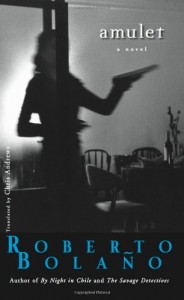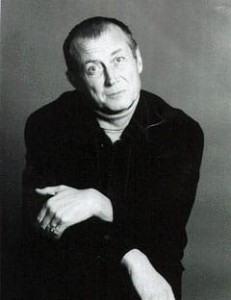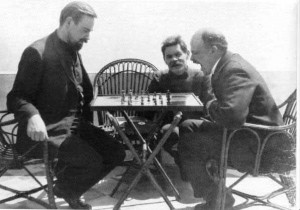=By= Gaither Stewart
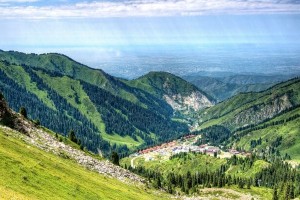
Chymbulak, Kazakhstan Photo by dr_sweet_al  … Attribution-NoDerivs License
… Attribution-NoDerivs License
=By= Gaither Stewart
(Extract from my Iranian diary; a Saturday in June, 1900s) Again, in the early morning, we had driven through the rugged Elburz Mountains from Tehran to the Caspian Sea, then west-northwest up the Caspian coast as far as Ramsar, and then doubled back east along the shore. I, the official interpreter, had wanted to head westwards for Tabriz and Azerbaijan, but the Italian businessmen were most eager to find a good fish restaurant. They entered the first place we saw. The Iranian-Armenian broker and I stood in silence at water’s edge. I was dreaming Caspian … and wondering about the distance to the northwest corner where the Volga River flows into this, the world’s largest enclosed body of water lined in the south by the Elburz and in the west by the great Caucasian mountains just out of our sight but whose presence we felt, range after range, peak after peak, crags and hidden streams. An impregnable fortress. The northern exposure here on the Iranian shores of the Caspian at the small town of Sulaleh is an enlightening geographical experience. We speak in the Armenian’s nearly native Russian as a result of his university studies in Yerevan, Armenia before his emigration to Iran. He points to the west to indicate his present home in Tabriz, Iran. Involuntarily, I mutter the names of cities on the western coast of the Caspian: oil-rich Baku in Azerbaijan (that today the U.S. so wants to get its hands on as it does on Armenia and occupy as it has their southern neighbor Georgia with all is wines and champagne.)I think of the North Caucasian Makhachkala, the capital of Russia’s Dagestan, occupied by the British during the Western intervention in the Russian civil war in 1919 before the city was occupied by the new Red Army in 1920. We speak of the genocide of the Armenians on Mt. Ararat perpetrated by the Turks. I tell him of my private Turkish language teachers, the first a Karachay from the confusing mix of peoples of the North Caucasus on the northen slopes of those great mountains; the second a real Kazakh from Kazakhstan. Both of their native languages are Turkic, transformed and consolidated in university studies in Turkey before their immigration to Germany. The engineer says I would like Tabriz where the street language is Azerbaijani Turkish, nearly Anatolian. My eyes shift to the eastern shores in search of the country of Turkmenistan before roaming northwards toward Kazakhstan. The huge Caspian Sea does look like a full-fledged sea. Yet only puny waves are rolling in, even though the southern part of the sea is said to reach over one thousand meters depth. Located between Europe and Asia the Caspian retains waters from the great Volga and Ural Rivers, the latter considered the dividing line between Europe and Asia. Hard to believe that it has no outflows. All its waters converge into surrounding lakes and swamps that nature equilibrates through evaporation. There was no chance to get to Kazakhstan over one thousand kilometers to the north and its flanks spread along the sea’s northeastern shores … but I felt it there. I do not tell the Iranian of my sensation of being very near the top of the world. I felt it was there, north of the Caspian, the top of the world, the center, where time perhaps stands still in which vacuum you perceive lies enormous power. The thing about this location on the Caspian is that you sense the presence of another world up there and that it has a core, the existence of which will one day surprise the world.
=By= Gaither Stewart
Special to The Greanville Post / Updated version
THE DETERMINANT CLASS OF CONTEMPORARY RUSSIAN HISTORY
People are oblivious to the debt the world owes to Russian civilization.
Russia! What a marvelous phenomenon on the world scene! Russia!—a distance of ten thousand versts (about two-thirds of a mile) in length on a straight line from the virtually central European river, across all of Asia and the Eastern Ocean, down to the remote American lands!. A distance of five thousand versts in width from Persia, one of the southern Asiatic states, to the end of the inhabited world—to the North Pole. What state can equal it? Its half? How many states can equal its twentieth, its fiftieth part? … Russia—a state which contains all types of soil, from the warmest to the coldest, from the burning environs of Erivan to icy Lapland, which abounds in all the products required for the needs, comforts, and pleasures of life, in accordance with its present state of development—a whole world, self-sufficient, independent, absolute. (Mikhail P. Pogodin- 1800-1875, Russian historian, journalist, intellectual of the Slavophile movement who held to the Norman theory that the Rus people from whom Russians descended, were Scandinavians.)
=By= Gaither Stewart
A bit of Lenin before breakfast gives you the strength of a hundred camels in the courtyard. (My adaptation of a Paul Bowles’ Arab adage)
(Rome) Il signore Drin Drin, Capri fishermen called Lenin in 1910 and 1912 when the revolutionary and his wife Nadezhda Krupskaya visited the Russian writer Maxim Gorky in his villa on the now famous island near Naples. Lenin did not speak Italian but he had heard the men he learned to fish with use a word he understood as drin drin (in Italian the onomatopoeia associated with ring or buzz) so the day he felt a bite on his pole, he shouted “drin drin.” Thus Vladimir Ilyich acquired his only known non-revolutionary nickname.
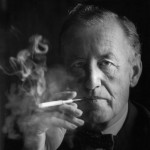
By Paul Carline, Associate Editor, The Greanville Post
“To Empire, with Love”
It’s said there are few safer bets in Hollywood than a Bond film.The latest offering in the extremely lucrative Bond franchise – “Skyfall” – has already broken box-office records, taking some $87.8 million in its first weekend in the USA, and easily covering its $200 million production costs in the first two weeks. So far, the Eon Productions series has grossed $4,910,000,000 (over $12,360,000,000 when adjusted for inflation) worldwide, making it the second highest grossing film series after “Harry Potter”.
In a world in which active compassion for our fellow humans was the norm, would such extravagances be tolerated? A question at least worth asking. But I’ll leave it open. I’m going to tackle the simpler question as to whether anything of consequence lies below the surface of the seemingly harmless escapism of the 007 movies, and in particular “Skyfall”. Continue reading »
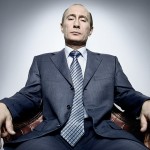
By Paul Craig Roberts
The morons who rule the American sheeple are not only dumb and blind, they are deaf as well. The ears of the American “superpower” only work when the Israeli prime minister, the crazed Netanyahu, speaks. Then Washington hears everything and rushes to comply. Israel is a tiny insignificant state, created by the careless British and the stupid Americans. It has no power except what its American protector provides. Yet, despite Israel’s insignificance, it rules Washington.
When a resolution introduced by the Israel Lobby is delivered to Congress, it passes unanimously. If Israel wants war, Israel gets its wish. When Israel commits war crimes against Palestinians and Lebanon and is damned by the hundred plus UN resolutions passed against Israel’s criminal actions, the US bails Israel out of trouble with its veto. Continue reading »
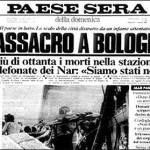
Lily Pad Roll
Journeys to the Outposts of the Empire
By Gaither Stewart
Scheduled for publication by Punto Press, Fall 2012
PREFACE
By Paul Carline
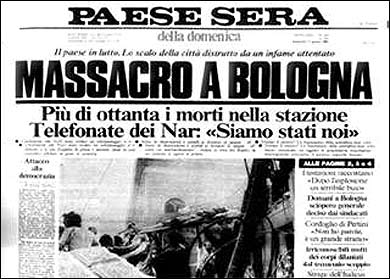
1980: Massacre in Bologna, 85 dead. Like in the attacks in Madrid, the target of the bomb that exploded on August 2nd, 1980, in the train station of Bologna (Italy) was the railroad. On that occasion the attack left 85 people dead and 150 wounded. The bomb was planted in the waiting room of the second-class passengers. It was August and it was an important intersection point of the national railroad traffic. The objective was to kill as many passengers as possible. The target was the common people: Bologna was a bastion of the Italian Communist party. By targeting people at random, the terrorists hoped to stampede the public toward a chronic “state of maximum security.” Sounds familiar?
Lily Pad Roll is the second part of Gaither Stewart’s Europe Trilogy. It was born, so to speak, out of the characters of the first novel, The Trojan Spy. According to its author, there was, to begin with, no intention of writing a trilogy. The Trojan Spy was completed and first published as a stand-alone ‘spy’ novel in 2010, but it seems that both the characters – and the evolving political background – presented cases of “unfinished business” for the author. Although the central character of The Trojan Spy – the Russian double-agent Anatoly Nikitin – was no longer around, having met a violent death on a mountain road in Italy, his ghost hovers over Lily Pad Roll, and his intimate connection with later events continues in the destinies of Elizaveta and Masha.
In his review of The Trojan Spy, Australian novelist Desmond O’Grady writes of Nikitin’s self-appointed mission “to uncover the deadliest of spy rings, the organizers of terrorism”. He observes that “the brutality and menace of terrorism has only increased since spies were supposed to have disappeared with the end of the Cold War, and that much of the world is hostage to a strategy of tension in which terrorism provides the pretext for creations like Homeland Security in the USA”. Continue reading »

